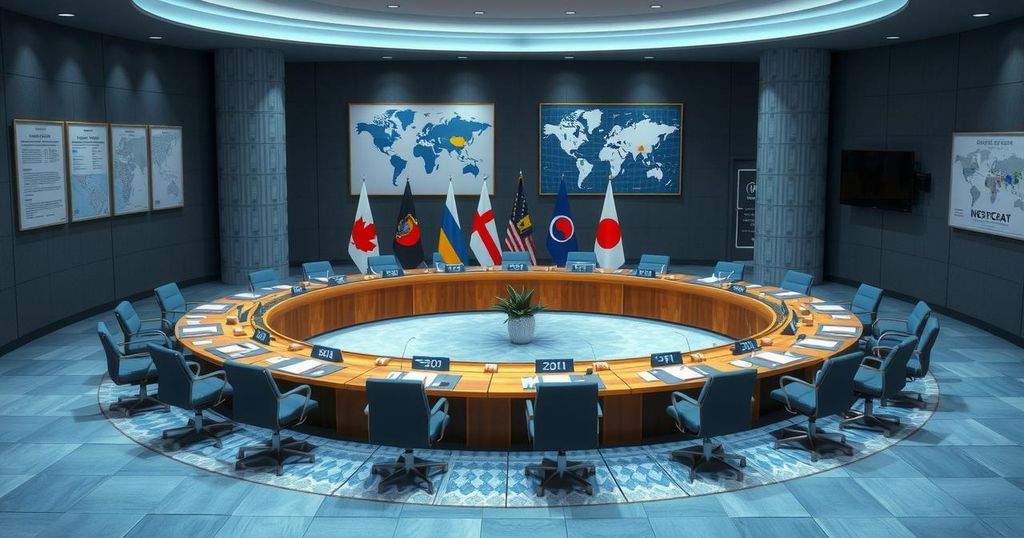This article emphasizes the risks of trusting Russia to mediate the Iran nuclear deal, highlighting its conflicting interests with the U.S. It suggests the Biden administration should instead collaborate with E3 allies (UK, France, and Germany) to enhance the maximum pressure campaign on Iran, preserving U.S. interests in the region.
Russian President Vladimir Putin recently agreed to mediate a nuclear agreement between the United States and Iran, a request allegedly made by President Donald Trump. U.S. Secretary of State Marco Rubio supported this initiative in discussions with Russian Foreign Minister Sergey Lavrov. Trump expresses strong interest in establishing a new deal with Iran, evidenced by his previous activities, including the signing of an executive order reimplementing the maximum pressure campaign against Iran.
The White House should reconsider this alliance with Russia. Russia’s interests align more closely with Iran, rendering it an inappropriate mediator that may compromise U.S. interests and those of its allies in the region. Past behaviors suggest skepticism towards Russia’s role, as they have historically contributed to instability rather than resolution in Middle Eastern conflicts.
Assuming Russia shares U.S. objectives regarding Iran’s nuclear capabilities is misguided. It is unwise to expect negotiations that would genuinely protect American interests, reminiscent of a scenario where predatory animals negotiate in bad faith. Thus, trusting Russia may lead to unfavorable outcomes for U.S. interests in the region.
Trump’s foreign policy has shifted starkly compared to that of former President Joe Biden, particularly regarding support for Ukraine against Russian aggression. Trump’s apparent interest in reconciliation with Russia raises concerns about inviting Moscow to mediate Iranian negotiations, as their past actions have frequently undermined U.S. credibility and relationships in the Middle East.
Russia has consistently supported adversaries of the U.S. in the region, including the Assad regime in Syria. They have aided Iran militarily, evidenced by supplying advanced weaponry to groups like Hezbollah and arming Houthi rebels in Yemen, who threaten maritime commerce and broader regional stability.
Moscow’s military and economic support to Iran complicates matters further. Russia has collaborated with Tehran on ballistic missile technology while simultaneously defying U.S. sanctions, thus strengthening Iran’s economic position and military capabilities. This partnership contrasts starkly with U.S. sanctions aiming to weaken Iran’s influence.
The growing dependence between Iran and Russia indicates that while Russia could leverage its influence to support a nuclear agreement, historical patterns reveal that their interests are more aligned with Tehran than Washington. Such dynamics could facilitate Iran’s nuclear ambitions rather than hinder them.
Given the critical importance of preventing Iran from acquiring nuclear weapons, U.S. dependency on Russia is misguided. The Trump administration should pivot towards multilateral cooperation with the E3 states—Britain, France, and Germany—who have a vested interest in limiting Iran’s nuclear advancements. Strengthening these ties can restore a position of authority in negotiations.
The E3’s perspectives on the nuclear deal may have evolved since their refusal to exit the Joint Comprehensive Plan of Action in 2018. Collaborating with allies would provide greater leverage and effectiveness in negotiations, aligning with Trump’s commitment to ensuring that Iran never achieves a nuclear weapon capability.
The article argues against trusting Russia as a mediator in the Iran nuclear deal due to its conflicting interests with the United States. Given Russia’s history of undermining U.S. interests in the Middle East, it suggests the U.S. should instead collaborate with the E3 states to strengthen negotiations from a united front, enhancing effectiveness in limiting Iran’s nuclear ambitions.
Original Source: foreignpolicy.com






